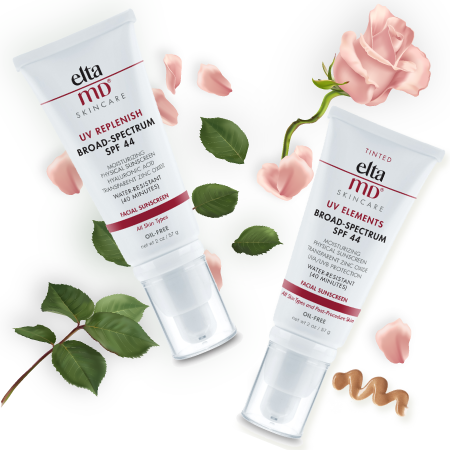Dry skin can be a big problem in winter or drier months. Many of my patients want to know what can be done about dry skin and how to prevent it. Let’s talk about moisturizing, gentle skin care, and knowing when it’s more than just dry skin.
Moisturizing
Look at your moisturizers and note if you use a lotion, cream, or an ointment. Each vehicle has different moisturizing characteristics.
- Lotions have a higher water content, are lighter in weight, and will typically feel less greasy.
- Creams have a higher oil concentration, are thicker, and can provide more of a barrier than lotions to keep skin hydrated.
- Ointments have an even higher oil concentration (80%). As a result, ointments are thicker than creams and have that greasy feel.
Lotions are great for normal or slightly dry skin, but creams will be a better choice for dry skin types or normal skin during the wintertime. Ointments are your best pick if you have extremely dry skin, especially if you suffer from eczema. Ointments are intended to be occlusive and provide a barrier. This protects against moisture loss, so keep this on your list of moisturizers during the dry months.
Lotions are great for normal or slightly dry skin. Creams are going to be a better choice for dry skin types or normal skin during the winter time. Ointments are your best pick if you have extremely dry skin, especially if suffering from eczema.
Gentle Skin Care
Many of these recommendations may be surprising to you, but trust us!
- Avoid long, hot showers. Hot water strips our skin’s moisture, and prolonged exposure should be limited when dealing with dry skin.
- Avoid a lot of soap….and go ahead and eliminate fragrances and dyes. Soap also strips our moisture. The more we use it, the drier our skin tends to be. If you are having issues with dry skin, you may consider using soap only in the folds or areas that need it (feet, underarms, etc.) instead of soaping up all over.
- Avoiding fragrances and dyes can eliminate the potential for allergic or irritant skin conditions, which is the last thing you want on top of your dry skin.
- Try not to scratch. Overly dry skin can become itchy, which leads to scratching, which may lead to more itching and possibly even a rash or infection. It’s a vicious cycle called the “itch-scratch” cycle, so try to avoid it.
When is it More Than Just Dry Skin?
The most common condition we see, often called “dry skin,” is eczema. There are many types of eczema, but let’s talk about two (2) common ones that present as dry skin.
- Atopic dermatitis: looks like red, dry patches of skin, most often starting in childhood. Most commonly in the bends of the elbow or behind the knees, but can be seen anywhere on the body. When scratched, this condition is quite itchy and leads to a rash. When flaring, a person may require prescription medication, but often, it can be prevented with moisturizing and gentle skin care.
- Asteatotic eczema is strictly due to dry skin and is often called “winter itch.” It can usually be prevented with moisturizing and gentle skin care. However, once the skin becomes very dry and itchy, it may also require prescription treatment.
So this new year, don’t forget your skin when making your New Year’s resolutions. These tips can keep your skin healthy and glowing and prevent the frustration of dry, winter skin. Of course, we invite you to call with questions or to make an appointment at Franklin Dermatology Group.





